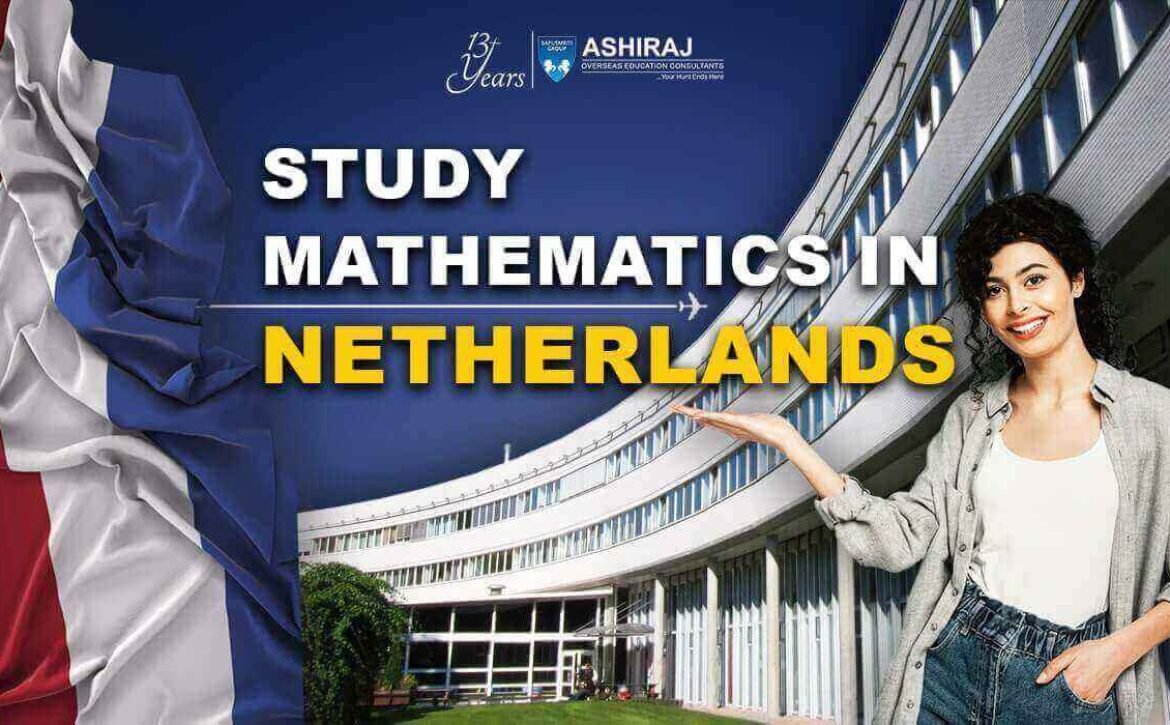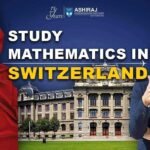
Mathematics in Netherland
Mathematics in the Netherlands holds a rich historical significance intertwined with the nation’s intellectual heritage. Renowned for its contributions to various branches of mathematics, the Netherlands boasts a vibrant mathematical community that thrives on innovation and collaboration. From the pioneering works of Dutch mathematicians like Christiaan Huygens and L.E.J. Brouwer to modern advancements in fields such as algebra, geometry, and computational mathematics, the Netherlands continues to play a pivotal role in shaping mathematical discourse globally. Its universities and research institutions serve as hubs for groundbreaking research, attracting mathematicians from around the world to exchange ideas and push the boundaries of mathematical knowledge.
Mathematics in the Netherlands enjoys robust institutional support and a conducive academic environment, fostering interdisciplinary research and fostering a culture of excellence. With a strong emphasis on education, the Dutch educational system encourages mathematical literacy from an early age, ensuring a steady pipeline of talent into the mathematical workforce. As the Netherlands continues to embrace technological advancements and the digital age, mathematics remains a cornerstone of its scientific and economic development, driving innovation and progress across various sectors. Through collaboration, innovation, and a commitment to academic rigor, Mathematics in the Netherlands continues to uphold its esteemed reputation on the global stage.
Why to Study Mathematics in the Netherlands?
- Rich Mathematical Heritage: The Netherlands boasts a rich history in mathematics, with renowned mathematicians like Christiaan Huygens and L.E.J. Brouwer contributing significantly to the field.
- Vibrant Academic Community: The country is home to a vibrant academic community dedicated to advancing mathematical research and education, offering a stimulating environment for students.
- Cutting-edge Research: Dutch universities and research institutions are at the forefront of mathematical research, conducting groundbreaking studies in areas such as algebra, geometry, and computational mathematics.
- Interdisciplinary Opportunities: Mathematics in the Netherlands transcends disciplinary boundaries, providing ample opportunities for interdisciplinary collaboration with fields like physics, computer science, and engineering.
- Quality Education: The Dutch educational system emphasizes mathematical literacy from an early age, ensuring high-quality education and fostering a culture of academic excellence.
- Global Recognition: Mathematics in the Netherlands enjoys global recognition for its contributions to the field, making it an ideal destination for aspiring mathematicians seeking to excel in their studies and careers.
- Career Prospects: Studying mathematics in the Netherlands opens doors to diverse career opportunities in academia, research, technology, finance, and more, both within the country and internationally.
- Cultural Experience: Apart from academic pursuits, studying mathematics in the Netherlands offers a unique cultural experience, with its rich history, vibrant cities, and welcoming atmosphere adding value to the educational journey.
Top Universities to Study Mathematics in Netherlands
Rank | University | QS World University Rankings 2023 | Type of University | Average Annual Fees | Programs Offered |
1 | University of Amsterdam | 35 | Public | €2,168 | Mathematics, Statistics |
2 | Delft University of Technology | 49 | Public | €2,143 | Mathematics, Applied Mathematics |
3 | Leiden University | 78 | Public | €2,083 | Mathematics, Mathematical Physics |
4 | Utrecht University | 82 | Public | €2,006 | Mathematics, Financial Mathematics |
5 | Eindhoven University of Technology | 121 | Public | €2,012 | Mathematics, Industrial Mathematics |
The Netherlands houses some of the world’s top universities renowned for their excellence in mathematics education and research. These institutions offer diverse programs in mathematics and related fields, providing students with opportunities to explore various specializations and embark on successful careers. With affordable tuition fees and a conducive learning environment, studying mathematics in the Netherlands is an attractive option for aspiring mathematicians seeking quality education and global recognition.
Course Curriculum for Mathematics in Netherlands
- Foundational Courses: The mathematics curriculum in the Netherlands typically begins with foundational courses covering topics such as calculus, algebra, and discrete mathematics, providing students with a solid understanding of core mathematical principles.
- Advanced Mathematics: As students progress, they delve into advanced topics including differential equations, linear algebra, real analysis, and complex analysis, equipping them with the necessary skills for higher-level mathematical inquiry.
- Specialized Electives: Universities in the Netherlands offer a wide range of specialized electives allowing students to tailor their studies according to their interests and career goals. These may include courses in areas such as applied mathematics, computational mathematics, mathematical physics, and financial mathematics.
- Interdisciplinary Opportunities: Mathematics programs often integrate interdisciplinary coursework, enabling students to explore connections between mathematics and other fields such as physics, computer science, engineering, and economics.
- Research and Projects: Many mathematics programs emphasize hands-on research experiences and collaborative projects, providing students with opportunities to apply theoretical knowledge to real-world problems and engage in cutting-edge research initiatives.
The course curriculum of Mathematics in the Netherlands is designed to foster analytical thinking, problem-solving skills, and a deep understanding of mathematical concepts, preparing students for diverse career paths in academia, research, technology, finance, and beyond.
Eligibility Criteria & Admission Requirements for MS in Mathematics in Netherlands
- Language Proficiency: Applicants are required to demonstrate proficiency in English by providing scores from either the IELTS or TOEFL exams. A minimum score of 6.5 in IELTS or 90 in TOEFL is typically required.
- Standardized Tests: Prospective students may need to submit scores from either the GRE or GMAT exams, depending on the requirements of the university. The GRE General Test is commonly accepted for mathematics programs, with competitive scores varying across institutions. Similarly, some universities may accept GMAT scores as an alternative.
- Academic Certificates: Applicants must provide proof of their academic qualifications, including transcripts and certificates from previous educational institutions. These documents should demonstrate a strong background in mathematics and related subjects.
- Work Experience: While not always mandatory, relevant work experience in mathematics or a related field can strengthen an applicant’s profile. This may include internships, research projects, or professional experience in industries requiring mathematical expertise.
- Passport & Student Visa: International applicants must possess a valid passport and obtain a student visa to study in the Netherlands. The visa application process typically requires proof of acceptance into a recognized educational institution, sufficient financial means, and health insurance coverage.
Test | Minimum Score |
IELTS | 6.5 |
TOEFL | 90 |
GRE | Varies |
GMAT | Varies |
The eligibility criteria for mathematics programs in the Netherlands encompass a combination of language proficiency, academic qualifications, standardized test scores, and relevant experiences, ensuring that applicants possess the necessary skills and preparation for rigorous academic study in the field.
Documents Required for Studying Mathematics in Netherlands
- Passport: A valid passport is essential for international students applying to mathematics programs in the Netherlands. It serves as proof of identity and nationality throughout the application process and during the duration of the study program.
- Letters of Recommendation (LOR): Most universities require applicants to submit two or more letters of recommendation from academic or professional referees who can attest to the applicant’s qualifications, skills, and suitability for the mathematics program.
- Statement of Purpose (SOP): An SOP is a crucial document that allows applicants to articulate their academic and career goals, explain their motivation for pursuing a mathematics degree in the Netherlands, and highlight their relevant experiences and skills.
- Curriculum Vitae (CV): A comprehensive CV detailing the applicant’s educational background, work experience, research projects, publications, and any other relevant achievements or extracurricular activities.
- Official High School Transcripts and Educational Certificates: Applicants must provide official transcripts and certificates from their high school or secondary education institution, demonstrating their academic performance and qualifications for higher education.
- Work Experience Certificate: If applicable, a work experience certificate verifying any relevant professional experience in mathematics or related fields can strengthen the applicant’s profile.
- Proof of Financial Resources: International students must demonstrate sufficient financial resources to cover tuition fees, living expenses, and other costs associated with studying in the Netherlands. This may include bank statements, scholarship award letters, or sponsorship letters.
Ensuring the timely and accurate submission of these documents is essential for a successful application to mathematics programs in the Netherlands, allowing prospective students to showcase their qualifications and readiness for academic study in the field.
Admission Process for Mathematics in Netherlands
- Research Universities: Begin by researching universities in the Netherlands offering mathematics programs, considering factors such as reputation, faculty expertise, and program curriculum. Universities like the University of Amsterdam, Delft University of Technology, and Utrecht University are renowned for their mathematics departments.
- Review Requirements: Carefully review the admission requirements for each university, paying close attention to criteria such as language proficiency (IELTS/TOEFL), standardized test scores (GRE/GMAT), academic transcripts, and any additional documents required.
- Prepare Documents: Gather the necessary documents for your application, including transcripts, certificates, standardized test scores, letters of recommendation (LOR), statement of purpose (SOP), curriculum vitae (CV), passport, and proof of financial resources.
- Submit Application: Complete the online application form for your chosen universities, ensuring all required fields are filled accurately. Upload your supporting documents as per the university’s instructions, paying attention to deadlines.
- Pay Application Fee: Some universities may require payment of an application fee. Ensure timely payment to avoid delays in processing your application.
- Interview (if required): Prepare for any interviews or additional assessments that may be part of the admission process. Be ready to discuss your academic background, interests, and goals in mathematics.
- Await Decision: After submitting your application, await the admission decision from the university. This may take several weeks, so be patient.
- Acceptance and Visa: Upon receiving an offer of admission, follow the university’s instructions to accept the offer and begin the visa application process if you are an international student.
Navigating the admission process for mathematics programs in the Netherlands requires careful planning, attention to detail, and timely submission of documents to maximize your chances of success in securing a place at your desired institution.
“Education is the most powerful weapon which you can use to change the world.”
Nelson Mandela
Cost of Mathematics Course in Netherlands
- Tuition Fees: The cost of tuition for mathematics programs in the Netherlands varies depending on the university and the level of study. On average, international students can expect to pay between €2,000 to €3,000 per year for tuition.
- Living Expenses: Living expenses in the Netherlands, including accommodation, food, transportation, and miscellaneous costs, can range from €800 to €1,200 per month, depending on the city and lifestyle.
- Scholarships and Financial Aid: Many universities in the Netherlands offer scholarships and financial aid opportunities to help offset the cost of studying mathematics. These may be merit-based, need-based, or specific to certain demographics or regions.
- Part-time Work: International students are permitted to work part-time while studying in the Netherlands, allowing them to earn additional income to cover living expenses. However, it’s essential to balance work commitments with academic responsibilities.
- Health Insurance: Health insurance is mandatory for all students studying in the Netherlands. International students must arrange for health insurance coverage either through a Dutch provider or an international policy recognized in the Netherlands.
Understanding the cost of studying mathematics in the Netherlands is essential for prospective students planning their finances and budgeting for their education abroad. With careful planning and consideration of available financial resources, studying mathematics in the Netherlands can be a rewarding and affordable experience.
Scholarships for Mathematics Courses in Netherlands
Scholarship Name | Amount | Application Deadline |
Holland Scholarship | €5,000 to €15,000 | 1st February |
Erasmus Mundus Scholarships | Varies | Varies |
Orange Tulip Scholarship | Full tuition fee waiver | Varies |
Amsterdam Excellence Scholarship | €25,000 | 15th January |
Utrecht Excellence Scholarship | €5,000 to €25,000 | 31st March |
Securing scholarships can significantly alleviate the financial burden of studying mathematics in the Netherlands. The Holland Scholarship offers financial assistance ranging from €5,000 to €15,000, with an application deadline of 1st February. Alternatively, the Erasmus Mundus Scholarships vary in amount and deadline, providing opportunities for international students to fund their studies. The Orange Tulip Scholarship provides a full tuition fee waiver and has varying deadlines. For exceptional candidates, the Amsterdam Excellence Scholarship awards €25,000, with an application deadline of 15th January. Additionally, the Utrecht Excellence Scholarship offers financial aid ranging from €5,000 to €25,000, with an application deadline of 31st March. Prospective students should carefully review the eligibility criteria and deadlines for each scholarship opportunity to maximize their chances of success in funding their mathematics education in the Netherlands.
Career Opportunities After Mathematics in Netherlands
Job Profile | Average Salary (EUR) |
Data Analyst | €40,000 – €60,000 |
Statistician | €45,000 – €70,000 |
Actuary | €50,000 – €80,000 |
Financial Analyst | €45,000 – €70,000 |
Software Developer | €45,000 – €75,000 |
Mathematics graduates in the Netherlands have diverse career opportunities across various sectors. Data Analysts utilize mathematical skills to analyze and interpret data, earning an average salary of €40,000 to €60,000. Statisticians apply statistical methods to analyze data and make informed decisions, with salaries ranging from €45,000 to €70,000. Actuaries assess financial risks and design strategies to mitigate them, earning between €50,000 to €80,000 on average. Financial Analysts use mathematical models to evaluate financial performance, with salaries ranging from €45,000 to €70,000. Software Developers with a mathematical background design and develop software solutions, earning an average salary of €45,000 to €75,000. Mathematics graduates in the Netherlands can pursue rewarding careers with competitive salaries in fields such as finance, technology, and data analysis.
Frequently Asked Questions About Mathematics in Netherlands
Some of the top universities in the Netherlands for mathematics programs include the University of Amsterdam, Delft University of Technology, and Leiden University.
The average tuition fee for mathematics programs in the Netherlands ranges from €2,000 to €3,000 per year for international students.
Yes, there are scholarships available for international students, such as the Holland Scholarship, Erasmus Mundus Scholarships, and Orange Tulip Scholarship.
Applicants are typically required to demonstrate proficiency in English through tests like IELTS (minimum score of 6.5) or TOEFL (minimum score of 90).
Yes, international students are allowed to work part-time during their studies, typically up to 20 hours per week.
Mathematics graduates in the Netherlands can pursue careers as data analysts, statisticians, actuaries, financial analysts, and software developers, among others.
Application deadlines vary depending on the university and program, but they usually fall between December and April for the following academic year.
While prior work experience is not always mandatory, relevant experience can strengthen an applicant’s profile and increase their chances of admission.
Yes, applicants typically need to submit documents such as academic transcripts, certificates, standardized test scores, letters of recommendation, statement of purpose, and proof of financial resources.
The duration of mathematics programs varies depending on the level of study. Bachelor’s programs typically last three years, while master’s programs can range from one to two years.




